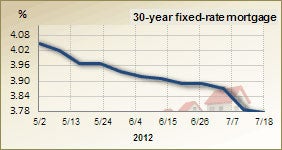The benchmark 30-year fixed-rate mortgage fell to 3.78 percent from 3.79 percent, according to the Bankrate.com national survey of large lenders. The mortgages in this week's survey had an average total of 0.43 discount and origination points. One year ago, the mortgage index stood at 4.68 percent; four weeks ago, it was 3.89 percent.
This is the lowest the 30-year fixed has reached in the history of Bankrate's survey. The rate has not increased in the weekly survey since April 4.
The benchmark 15-year fixed-rate mortgage fell to 3.04 percent from 3.05 percent, while the benchmark 5/1 adjustable-rate mortgage fell to 2.89 percent from 2.95 percent.
Weekly national mortgage survey
Results of avg. rates as of July 18, 2012, weekly national survey of large lenders and the effect on monthly payments for a $165,000 loan:| 30-year fixed | 15-year fixed | 5-year ARM | |
|---|---|---|---|
| This week's rate: | 3.78% | 3.04% | 2.89% |
| Change from last week: | -0.01 | -0.01 | -0.06 |
| Monthly payment: | $766.95 | $1,142.64 | $685.90 |
| Change from last week: | -$0.94 | -$0.79 | -$5.31 |
Becker says he has been swamped with calls from refinancers, and many of them are from clients that refinanced in the past year or so.
A lot of people who probably thought they were done are calling again. I'm fielding calls at 9 (p.m.), 10 p.m., and I take them because you never know when this is going to stop.The volume of mortgage applications increased about 17 percent last week from a week earlier, according to the Mortgage Bankers Association weekly survey. Refinances accounted for more than 80 percent of total applications.
How long will the party last?
Rates eventually will rise, but many mortgage experts say they don't expect a major spike anytime soon.As long as the European debt crisis remains unresolved and until the economy in the United States shows solid growth, rates should stay near or at bottom.
What would cause rates to go up? Good news out of Europe -- I don't see that happening -- or unemployment going down -- I don't see that happening.
The U.S. economy has started to recover, but it's still far from healthy. Federal Reserve Chairman Ben Bernanke reminded Congress of that in a speech this week. "After running at nearly 200,000 per month during the fourth and first quarters, the average increase in payroll employment shrank to 75,000 per month during the second quarter," Bernanke said.


No comments:
Post a Comment
Note: Only a member of this blog may post a comment.